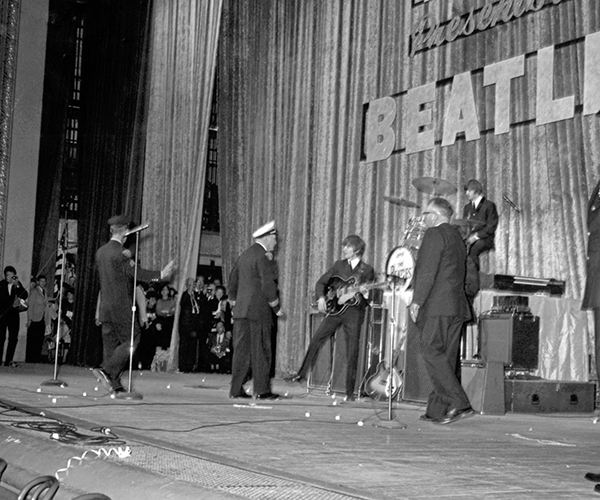CM: Do people ever misunderstand the name of the institute? Do they ever think it means free love?
SP: Do you know this guy Michael Feldman? He [hosts the NPR show] "Whad'Ya Know?" He came to Cleveland [in September]. So he had me up there [on the show] for a half an hour. [He asked,] "Now, Dr. Post, what kind of love are we talking about here?"
And I told him, "The love that parents have for kids, that gets people down to New Orleans [to help after the hurricane], and makes competent doctors great healers ? and even the kind of love you have, through humor, with this audience."
CM: As president of an institute that studies platonic love, do you ever get jealous of all the attention romantic love gets?
SP: No! I like romantic love. I think the world would be pretty dreary without it. I disagree with C.S. Lewis' argument that romantic love is just a historical artifact that somehow was created in the 12th century by the courtly romantics. Brain science tells us something different. Evolution has hard-wired us for romantic love.
But if romantic love is not surrounded by friendship and by the kind of loyal and unlimited love that gets us through when a spouse is depressed or ill, when you're undergoing the stress of conflicts in marriage, when finances get tough and you start to bicker about priorities ? unless you have a deeper spiritual and moral form of love, in general, romantic love will not sustain a relationship. And it will create an awful lot of panicky insecurity.
Psychiatrists ? this is well-documented ? 30 or 40 years ago were besieged by sexually repressed patients. They are now besieged by patients who have been distressed by relationships that seem to have no holding power. People begin to feel used. ? About a third of people, after the breakup of these fleeting relationships, report clinical depression. ?
Romantic love alone has a half-life of about 18 months, basically 6 months to 3 years. The honest romantics understood that romantic love is fleeting.
The role of deeper forms of love, like friendship and the kind of unconditional love that I'm especially interested in, is to provide a safe haven for romantic love so [it] can flower and last and become more fruitful.
CM: What have you learned about altruism?
SP: We've learned a lot about how generous people ? generally speaking ? live happier, healthier and longer lives. Right here on my desk is the "Oxford Handbook on the Science of Altruism and Health," which [I edited and] I'm sending out tomorrow. It's coming out in about six months. This is a collection of 23 distinguished studies by leading scientists in the United States, basically focusing on the theme that it's good to be good, it is better to give than receive.
We know that older adults, 60 and older, who engage in reasonable ? not overwhelming ? volunteerism, have a reduction in mortality rates over a five-year period that can range from 20 percent to 40 percent. That's when compared to people who are not socially engaged, not involved in helping behavior.
We find that adolescents who are involved in helping behavior are happier, have lower rates of depression ? not to mention the fact that they tend to do better in school because they have something to study about that's beyond themselves. When people have a nobility of purpose, are meaningfully focused on the well-being of others, they tend to do better in school, they tend to do better in colleges, tend to go on to graduate professional schools.
One of our remarkable studies, if you look at the lives of these kinds of young people, early on and through middle age, they're relatively free of mid-life diseases of various sorts. They're certainly relatively free of depression and anxiety.
CM: How does altruism make you healthier?
SP: We have brain scans of compassion that show this tremendously powerful region of activity in the brain. We are deeply evolved and hard-wired to be concerned for others.
When people are in a state of compassionate love, their stress is reduced. The stress response is well-defined as the cause of a great deal of mental and physical health [problems]. When the amygdala, the fight/flight aspects of the brain, are left turned on in an extended way, we suffer very adverse results.
The best way to displace negative emotions like hate, vengeance, jealousy, rage is through the cultivation of positive emotions, which are all expressions of love. There are a lot of studies of forgiveness, for example, and how bad rumination is, how bad it is it fixate in resentment on someone who has wronged you. This rumination, the inner turning that goes on inside the unforgiving, leaves their stress response turned on. As a result, you have an elevation in stress-related hormones and a decrease in immune function.
CM: What sort of work has the institute itself funded?
SP: We look at evolution, human development, neuroscience and positive psychology, which studies the impact of emotions like hope, forgiveness, gratitude ? all of which I view as manifestations of love.
We've funded five studies on adolescents, altruism and mental health. We've funded four studies on older adults' well-being, health and volunteerism. We've funded five studies on the neuroscience and biology of compassion. It's a long list.
We started funding these projects in 2001 and 2002. The results are just beginning to come in.
CM: What have you learned about the challenges to compassion or the limits of it?
SP: Unselfish love can be badly inhibited by certain styles of parenting. We have funded studies by Nancy Eisenberg at Arizona State University in this area.
It turns out that you've got to have good empathy in a parent. You've got to have a parent who knows how to listen attentively, in an undistracted way, to a child. You need a parent who models caring behavior in even small ways, with tone of voice, with facial expression.
And you need a parent who has a style of intervention, which Nancy Eisenberg calls authoritative, but not authoritarian and not permissive. An authoritarian parent is a browbeater, so overwhelming with a child that the child really becomes altruistically inhibited. On the other hand, you don't want permissivity, because that doesn't work either.
But an authoritative parent, Eisenberg argues, is one the child will remember very favorably later in life for having intervened in ways that were respectful.
CM:You've identified"carefrontation" - what some people call "tough love" or gentler attempts to influence someone, as a type of altruistic love. Any advice on when and how to confront someone in a caring way when they don't want to listen?
SP: The first thing is, internally, to remember you don't want to lose your groundedness in love on an emotional level. You don't want to give way to rage, the kind of burning fire that simply destroys the other rather than leaving room for change. The remarkable thing about people who are good at carefrontation is that they are able to confront people but make those people feel good about it in the process. You confront, but you don't do it with arrogance, you don't do it with intolerance. You always love the other person, but that doesn't mean you love what they do.
The person of great love is not the last person to speak up in the room when there's a problem. Probably, she's the first person. In fact, the person of great love can be a pain in the neck for the status quo. ? I don't think the person of love is just Mr. Nice Guy or Miss Nice Guy. ... Look at Gandhi! Gandhi was very clear. He said: You cannot be a person of love unless you are a person of courage.



